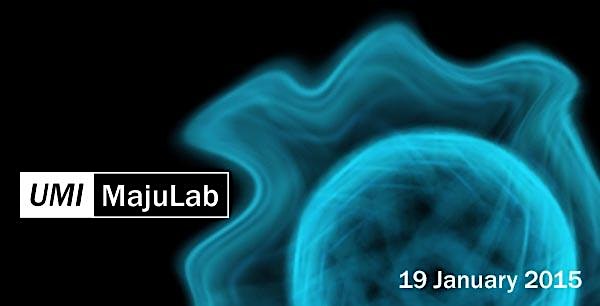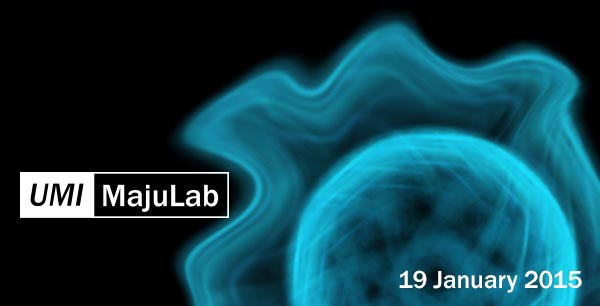
From Quantum Physics to Water Pearls
Date and time
Location
University Hall Auditorium
Level 2, Lee Kong Chian Wing 21 Lower Kent Ridge Road Singapore, 119077 SingaporeDescription

We are delighted to offer tickets to the official opening event of the MajuLab, a new joint French-Singaporean research centre in quantum and condensed matter physics (read more about the lab here).
Join us at NUS University Hall for accessible talks by eminent speakers starting from 1.30pm on Monday 19 January.
PROGRAMME: (scroll down for full talk details)
13h30 - 14h00 official speeches and welcome address
14h00 - 15h00 Manipulating Atoms with Photons and Photons with Atoms by Claude Cohen-Tannoudji (Collège de France, Nobel Prize in Physics 1997)
15h00 - 16h00 What can we do with a quantum liquid? by Tony Leggett (University of Illinois at Urbana-Champaign, United States, Nobel Prize in Physics 2003)
16h00 - 16h30 coffee/tea break
16h30 - 17h30 Quantum property testing by Ronald de Wolf (Centrum Wiskunde & Informatica, the Netherlands)
17h30 - 18h30 Water pearls by David Quéré (PHHM and Ecole polytechnique, France)
Registration is free but required. The UMI kick-off event will continue 20-22 January with more specialised scientific talks intended for researchers. Find the full programme here.
TALK DETAILS:
Manipulating Atoms with Photons and Photons with Atoms
Claude Cohen-Tannoudji (Collège de France, Nobel Prize in Physics 1997)
It is possible to use the basic conservation laws in atom-photon interactions for manipulating atoms with photons. It will be shown in this lecture how it is possible in this way to polarize atoms, to cool them to very low temperatures, in the microkelvin, and even in the nanokelvin range. A review will be given of recent developments in this field, including ultra-precise atomic clocks, with errors less than one second in one billion years, the realization of new states of matter such as Bose-Einstein condensates, matter waves and atom lasers. New perspectives opened by these results will be briefly discussed. It is also possible to manipulate photons with atoms. By sending atoms in a cavity containing photons, one can prepare mesoscopic linear superpositions of photon states and study how they are destroyed by the decoherence processes resulting from the coupling with the environment. By analysing the state of the atoms when they exit from the cavity, one can also detect the presence of a photon in the cavity without destroying it.
What can we do with a quantum liquid?
Tony Leggett (University of Illinois at Urbana-Champaign, United States, Nobel Prize in Physics 2003)
Quantum liquids are physical systems which display the effects not only of quantum mechanics but also those of quantum statistics, that is of the characteristic indistinguishability of elementary particles.The most spectacular manifestations of quantum statistics are the phenomenon of Bose-Einstein condensation and the closely related one of Cooper pairing; in both cases a finite fraction of all the particles in the system are forced to all do exactly the same thing at the same time, and as a result effects which would normally be obscured by thermal noise may become visible, sometimes spectacularly so. I will review some examples of such behavior in degenerate alkali gases, superconductors and superfluid helium-3.
Quantum property testing
Ronald de Wolf (Centrum Wiskunde & Informatica, the Netherlands)
"Property testers" are algorithms that can efficiently handle very large amounts of data : given a large object that either has a certain property or is somehow “far” from having that property, a tester should efficiently distinguish between these two cases. In this talk we describe recent results obtained for quantum property testing. This area naturally falls into three parts. First, we may consider quantum testers for properties of classical objects. We survey the main examples known where quantum testers can be much more efficient than classical testers. We also describe one new result : a quantum algorithm for testing whether a given n-bit Boolean function f is a k-junta (i.e., depends on only k of the n input bits) using roughly sqrtk queries to f, which is quadratically faster than the best classical testers. Second, we may consider classical testers of quantum objects. This is the situation that arises for instance when one is trying to determine if untrusted quantum states or operations are what they are supposed to be, based only on classical input-output behavior. Finally, we may also consider quantum testers for properties of quantum objects, such as whether two states or unitaries are equal, whether a state is separable, etc. This is based on joint work with Ashley Montanaro (survey arXiv:1310.2035) and with Andris Ambainis, Aleksanders Belovs, and Oded Regev (k-junta testing).
Water pearls
David Quéré (PHHM and Ecole polytechnique, France)
We show how special materials found in Nature shape water in quasi-spherical pearls. We focus on the functions generated by these materials, such as water (and even oil) repellency, self-cleaning effect, anti-fogging abilities or super-aerophilicity. We also emphasize the very unusual dynamical behaviors of liquids generated in such situations, and discuss in particular the nature of the residual friction associated with these non-wetting states.
Organised by
Would you like to receive announcements about CQT public events by email? Sign up here.
More about us
The Centre for Quantum Technologies (CQT) is a national Research Centre of Excellence in Singapore. It brings together physicists, computer scientists and engineers to do basic research on quantum physics and to build devices based on quantum phenomena. Experts in this new discipline of quantum technologies are applying their discoveries in computing, communications and sensing.
The Centre was established in December 2007 with support from Singapore’s National Research Foundation and Ministry of Education. CQT is hosted by the National University of Singapore (NUS) and also has staff at Nanyang Technological University (NTU).
Data protection